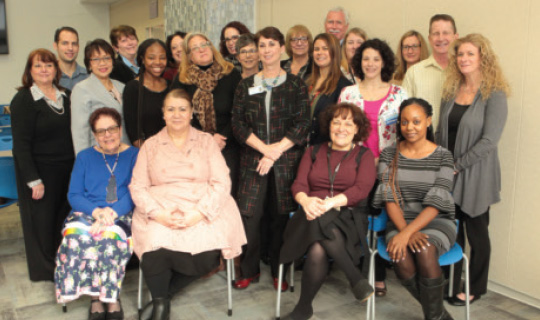A new program aims to improve the care of behavioral health patients.
 Last December, the Monmouth Medical Center (MMC) Foundation approached the Board of Trustees with a new opportunity to have an impact on the community: Zero Suicide, a national, evidence-based program that aims to help health care systems improve the care of behavioral health patients and eliminate suicide deaths. “Many have seen the impact of the suicide epidemic on the community,” says Tara F. Kelly, Vice President of the MMC Foundation.
Last December, the Monmouth Medical Center (MMC) Foundation approached the Board of Trustees with a new opportunity to have an impact on the community: Zero Suicide, a national, evidence-based program that aims to help health care systems improve the care of behavioral health patients and eliminate suicide deaths. “Many have seen the impact of the suicide epidemic on the community,” says Tara F. Kelly, Vice President of the MMC Foundation.
“It has affected every generation, and our Board was steadfast in wanting to put their arms around this program.” Thanks to the generous gift from the Board, the MMC Department of Behavioral Health created a virtual Suicide Prevention Center, which will explain the Zero Suicide program. MMC is only the second hospital in New Jersey to adopt the program. “The goal is to address gaps in service,” says Erin Langford, MSN, RN, BC, Administrative Director for Behavioral Health Services.
“Most people who commit suicide have seen a physician in the six months prior to the event. We have the opportunity to intervene if we partner with other health providers in the community.” The program aligns well with MMC’s Safety Together journey, which refers to the hospital’s commitment to zero incidents of preventable harm. In addition to its commitment to patient safety, Zero Suicide is also committed to the safety of behavioral health clinicians.
Improving best practices
In February, MMC held a conference on how to implement the Zero Suicide program. It featured national mental health experts such as Michael F. Hogan, PhD, the former Commissioner of the New York State Office of Mental Health and Connecticut Department of Mental Health, as well as a suicide attempt survivor. More than 150 MMC staff members attended the conference. While many best practices for suicide prevention are already in place at MMC, “we are now implementing processes to create a safety net for patients,” says Langford. “The conference sparked ideas on what we need to be doing differently and better.” The next step is for MMC Behavioral Health staff members to attend additional Zero Suicide-sponsored training programs and validate the processes that are in place.
In the meantime, MMC is partnering with local schools to educate children and parents about suicide prevention. In a recent assembly at a middle school in Little Silver, MMC clinicians spoke with children and parents about coping with issues such as bullying and anxiety. Afterward, the
children were dismissed and the parents were invited to stay for a question-and answer session. “We feel that zero suicide is achievable,” says Langford. “If we set our goal at anything less, then we’re saying some percentage of suicide is acceptable.”
Suicide prevention hotline
If you’re thinking about suicide, are worried about a friend or loved one, or would like emotional support, the free, confidential National Suicide Prevention Lifeline network is available 24/7 across the United States by calling 800.273.8255.
To learn more, visit Zero Suicide.